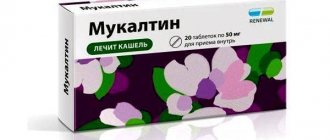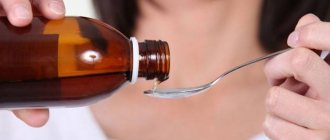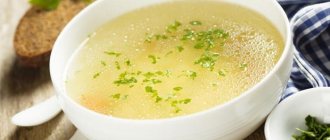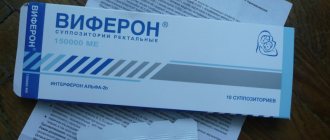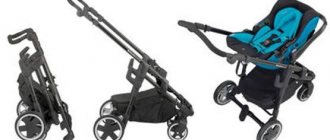List of antipyretics for children under one year of age
All modern antipyretics belong to a specific group based on the type of active substance. Good antipyretics include:
- paracetamol-based products (Efferalgan, Panadol, Paracetamol). They can be produced in the form of rectal tablets or suppositories, suspensions. Contraindicated for patients with liver disease, kidney disease, viral hepatitis, diabetes mellitus;
- medications that contain ibuprofen (Nurofen, Ibuprofen, Ibufen). Approved for use only from the third month of the baby’s life. They cannot be used for asthma, liver disease, kidney disease, hearing impairment, blood disease, ulcers, gastritis;
- homeopathic group of antipyretic drugs (Viburkol). Presented in the form of rectal suppositories. They have no age restrictions. They cannot be used if the components are intolerant.
Important! An antipyretic for a newborn (up to 1 month) from birth is prescribed exclusively by a pediatrician. Self-administration of the drug is dangerous due to overdose and side effects.
Next, we will look at which antipyretics are best to choose, taking into account their characteristics.
Antipyretic suppositories for newborns up to 1 year
The main advantage of antipyretic suppositories is the lower number of side effects compared to the liquid form. Suppositories are absorbed through the rectal mucosa without affecting the digestive tract. Flavorings and dyes are added to syrups. This dosage form may cause an allergic reaction in infants prone to allergies.
Antipyretic suppositories based on paracetamol
Candles Tsefekon D
Approved for use from 1 month of age.
- children weighing 4 – 6 kg (child’s age 1 – 3 months) – 1 suppository 50 mg;
- infants weighing 7 - 12 kg (child's age 3 -12 months) - 1 suppository 100 mg.
Apply no more than 3 times per day. The interval between doses is 4 – 6 hours.
Panadol suppositories
For a child under one year of age, it is necessary to purchase suppositories with a dosage of 125 mg of paracetamol in one suppository. Allowed for children from 6 months in a dosage of one suppository. It is allowed to place no more than 4 candles per day with 4-hour breaks. You can use it for 5-7 days. Panadol has an analgesic and antipyretic effect.
Antipyretic suppositories based on ibuprofen
Nurofen suppositories
Used from three months of age. One suppository contains 60 mg of ibuprofen. It is allowed to use the drug after 6 hours.
- children weighing 6 - 8 kg are prescribed 0.5 - 1 suppository no more than 3 times a day;
- if the baby's weight is 8.5 - 12 kg, 1 suppository is prescribed no more than 4 times a day.
Antipyretic suppositories for newborns
You can find quite a lot of them in pharmacies. However, not all children tolerate suppositories well, even for newborns; here you need to pay attention to the baby’s characteristics. Some people can take syrups, solutions against temperature, while others are suitable for suppositories. What kind of suppositories can be given to infants? All that are marked from 3 months to 6 years . There will be nothing terrible if the child is under 3 months old, since with this marking manufacturers are reinsured against various unforeseen cases. In fact, baby candles for very young children under one year old are completely safe. And only in very rare cases do they have any adverse consequences. And only if they were used for other purposes.
In pharmacies you can find suppositories for babies such as Nurofen, Tylenol, Panadol for children, and Effelargan. Cefekon D suppositories . They are very convenient and safe to use, cause minimal inconvenience when inserted and are suitable for newborns of different weights.
Suspensions and syrups for children from one month to 1 year
There is often confusion with the name of liquid antipyretic drugs for children in terms of classifying them as syrups or suspensions. The basis of syrups is a concentrated aqueous solution of sucrose and/or its substitutes, and suspensions are a liquid medium in which particles of the active substance are distributed in suspension. Over time, with prolonged standing, these particles can settle to the bottom, so the suspension must be shaken before using. Both taste sweet, but in syrups the sweetness is mostly due to sugar (most often sucrose), and in suspensions, sweeteners (for example maltitol) and/or sweeteners, much less often sucrose. Sweeteners are able to be absorbed by the body because they provide energy value, while sweeteners are substances that are not a source of energy, although they taste sweet. Therefore, if a child is prone to allergies, it is better to choose a product that does not contain sucrose.
Antipyretic suspensions based on ibuprofen
Used from three months of age. It is allowed to use the drug after 6 hours.
Suspension Nurofen
Analogues are Ibuprofen suspension, Ibufen suspension, Bofen suspension.
How to give:
- infants 3–6 months old weighing at least 5 kg are prescribed 2.5 ml 1–3 times a day;
- if the child's age is from 6 months to 1 year, use 2.5 ml 1 - 4 times a day.
Antipyretic suspensions and syrups based on paracetamol
Children from 3 months to one year can take 60-120 mg of paracetamol at a time. If the child has not yet reached three months, then the dose is calculated based on the child’s weight - 10 mg per kilogram. It cannot be used more than 4 times a day. Children under 3 months. used only after medical prescription.
Panadol suspension
How to give:
- with a body weight of 6-8 kg, 4 ml of suspension is prescribed;
- 8-10 kg - 5 ml of Panadol suspension.
Efferalgan syrup
The dosage is carried out using a measuring spoon, on which divisions are marked corresponding to the child’s body weight, starting from 4 kg and up to 16 kg at intervals of one kilogram. All even numbers are marked, and odd numbers are divisions without a number. Medicines must be taken as much as the child weighs. If the child has not reached 4 kg, it is not recommended to use the drug.
Calpol suspension
An analogue is a suspension of Paracetamol for children.
At the age of three months to one year, give the child from 2.5 ml (child’s body weight 4-8 kg) to 5 ml (child’s body weight 8-16 kg) of the suspension. Contraindicated for children under one month.
Video: Komarovsky about antipyretics
Dosage forms of antipyretics for children
Parents who give their child antipyretic drugs for children should remember that such therapy is purely symptomatic, aimed at alleviating one of the painful manifestations of the underlying disease, on the cause of which the definitive treatment should be concentrated.
At high temperatures in children, antipyretic drugs in any dosage form should be prescribed in dosages calculated primarily in accordance with the child’s body weight, and then with his age (you need to pay attention to the age restrictions prescribed in the official instructions). So, for example, recommended remedies for fever in a 2-year-old child may be contraindicated for children 5-6 months old. Also, the choice of a pediatric antipyretic should be based on the ease of use, speed of action, individual patient sensitivity to the active ingredient of the drug, concomitant diseases and cost.
Today, the list of antipyretic drugs in various dosage forms intended for patients of any age category is quite wide (tablets, suppositories, capsules, syrups, powders, suspensions, etc.). Their composition is specially selected for children, and the release form is designed for ease of use in accordance with the child’s age and functionality.
Antipyretic suppositories for children
At this time, suppositories for high fevers for children under one year of age and older are recognized as the safest medicinal antipyretic drugs. The rectal method of administering the suppository for children under 1 year of age virtually eliminates side effects such as nausea / vomiting , which sometimes occur when taking tablets, sweet suspensions, syrups and other oral dosage forms, and therefore the therapy is more easily tolerated by the youngest patients. The onset of action of the suppositories is observed after approximately 40 minutes and lasts for approximately 4-6 hours.
Efferalgan candles
It is better to administer rectal dosage forms after first emptying the patient’s intestines. Some baby suppositories for fever can be recommended for a child already from one month of his life ( Efferalgan ), if he gains weight over 4 kilograms, but only in minimal dosages and under the supervision of a pediatrician.
Basically, they practice the use of antipyretic suppositories for children from 1 year, starting from 3 months ( Nurofen , Panadol , Cefekon D ) in doses corresponding to body weight. For children aged 1-2 years, whose parents are wary of medications created on the basis of chemical ingredients, therapy can be offered using homeopathic suppositories Viburkol , also quite often prescribed by pediatricians to reduce fever.
Rectal suppositories containing paracetamol are represented by the following drugs:
- Efferalgan (80 mg, 150 mg, 300 mg);
Candles Tsefekon D - Panadol Baby (125 mg, 250 mg);
- Cefekon D (50 mg, 100 mg, 250 mg).
Efferalgan suppositories in a minimum dosage can be prescribed from 1 month, suppositories from other manufacturers from 3 months of life. The maximum daily dosage for all suppositories in this group is calculated based on the ratio of 60 mg of paracetamol per 1 kg of child weight. In 24 hours, you can use no more than 4 suppositories (every 6 hours) appropriate for your age and body weight. It is better to limit the duration of antipyretic therapy to three days.
ibuprofen as an active ingredient are represented by the following drugs:
- Nurofen (60 mg);
Nurofen suppositories for children - Ibuflex (60 mg);
- Ibuprofen for children (60 mg).
All drugs in this group can only be used from 3 months of age. The maximum daily dosage for all these suppositories is calculated based on the ratio of 30 mg of ibuprofen per 1 kg of child weight. In 24 hours, you can use no more than 3 suppositories (every 6-8 hours) appropriate for your age and body weight. It is better to limit the duration of antipyretic therapy to three days.
Homeopathic rectal suppositories Viburkol include components of various origins: conhe, plantago, chamomilla, dulcamara belladonna, pulsatilla in homeopathic dilution.
These suppositories are indicated for use in combination therapy of childhood respiratory diseases and have anti-inflammatory and antipyretic effectiveness. Viburkol can be used starting from 6 months of life. To reduce fever, children over 6 months old with medical thermometer readings above 37.5 °C are prescribed 1 suppository 4 times every 24 hours; at temperatures above 38 °C - administration of 1 suppository 6 times a day. After normalization of the temperature, treatment should be continued for another 3-4 days with the introduction of 1 suppository 1-2 times a day.
Suspensions and syrups for temperature control for children
Antipyretic suppositories for children over 3 years of age are used less frequently, giving preference to liquid dosage forms, probably due to their faster action and taste.
Various antipyretic syrups, powders in granules in bags for the preparation of oral solutions and ready-made suspensions mainly contain various flavoring additives and sugar. It is these “sweet” ingredients that help children swallow the medicine, but can also cause nausea or even vomiting, which will weaken or completely eliminate the effectiveness of the drug taken.
A large amount of sugar in some cases ( diabetes mellitus or any intolerance to sugars ) may be contraindicated for a child and therefore parents are required to carefully monitor how much of it a particular medicine includes.
The onset of action of liquid medicinal preparations, as a rule, is noted after 20-30 minutes and lasts for 4-6 hours. Some medications can be diluted with water, tea, milk, others are intended for internal use in their pure form.
Efferalgan syrup
Starting from the second month of life, according to the instructions (under constant monitoring and with caution), the child can be given the same Efferalgan , while the age limit for other similar drugs is most often 3 months ( Calpol , Nurofen , Ibufen ), and sometimes 6 months. Dosages of liquid medicines are also calculated based on the patient’s weight, and to accurately measure them, a measuring container (spoon, cup or syringe) is always included in the secondary packaging.
Liquid medicines based on paracetamol :
- Efferalgan syrup (30 mg/ml, 90 ml or 150 ml in a bottle);
- Panadol Baby suspension (120 mg/5 ml, 100 ml or 300 ml in a bottle);
- Calpol suspension (120 mg/5 ml, 70 ml or 100 ml in a bottle);
- Paracetamol for children syrup/suspension (120 mg/5 ml, 50 ml or 100 ml in a bottle).
In this group, from one month of life, children can take Efferalgan Paracetamol suspension , other drugs are indicated for use only from 3 months.
The average single dose of liquid paracetamol, depending on the weight of the child, varies between 10-15 mg/kg in 3-4 doses per day. A child can drink a suspension or syrup at a dose of 60 mg/kg within a maximum of 24 hours. The interval between oral administration of any drug should be 4-6 hours. For accuracy and convenience of dosing, you should use the measuring container included with the selected drug. It is better to limit the duration of antipyretic therapy to three days.
Ibufen syrup
Liquid preparations containing the active ingredient ibuprofen :
- Nurofen (100 mg/5 ml, 100 ml or 200 ml in a bottle);
- Bofen (100 mg/5 ml, 100 ml in a bottle);
- Ibufen (100 mg/5 ml, 100 ml in a bottle).
All these drugs can be used to treat children over 3 months of age. A single dose of liquid ibuprofen, depending on the child’s weight, ranges from 5-10 mg/kg in 3-4 doses per day. The maximum dose a child can take per day is 30 mg/kg.
The interval between oral administration of these medications should be 6-8 hours. Convenience and accuracy of dosing is provided by the measuring container included in the kit for the selected drug. It is better to limit the duration of antipyretic therapy to three days.
Antipyretic tablets, capsules
Capsules and tablets for fever for children (including effervescent forms) are mainly indicated for use from 6 years of age. This age limit is associated with a rather impressive dose of the active ingredient contained in the solid dosage form and the inability to accurately measure the dosage by dividing the capsule or tablet into parts.
These dosage forms, like their liquid counterparts, can also include many different additional substances, which will certainly affect which fever tablets to choose for treating a particular child. Before taking any product, parents should make sure that their child does not have allergic reactions to all its components, or begin treatment by taking minimal doses.
Panadol for children
The onset of action of solid therapeutic drugs varies depending on their dosage form. Regular capsules and tablets begin to act after 20-30 minutes ( Nurofen , Piaron , Panadol ), and their effervescent counterparts after 10-15 minutes (soluble tablets Efferalgan ). In terms of duration of effectiveness, solid oral forms are not inferior to others; their effect lasts 4-6 hours.
The list of solid antipyretic dosage forms (tablets, capsules) is very large and includes many manufacturers from different countries.
The most famous paracetamol are:
- Efferalgan;
- Piaron;
- Milistan;
- Panadol;
- Daleron;
- Rapidol Retard , etc.
Popular representatives of drugs with ibuprofen :
- Nurofen;
- Advil;
- Ibuprom;
- Faspik , etc.
The dosage of these drugs for the treatment of fever in children 6-12 years old is determined by the doctor on an individual basis. For paracetamol , it varies between 200-500 mg in 3-4 doses per day. For ibuprofen - within 100-200 mg in 3-4 doses per 24 hours. It is better to limit the duration of antipyretic therapy to three days.
Antipyretic drugs prohibited for infants
- Combined tablets containing ibuprofen and paracetamol (Ibuklin Junior tablets). They can be used for children over 3 years of age.
- Analgin. It is not used for children. It can be used as part of a lytic mixture if it is not possible to reduce the temperature for a long time by other methods. Used only in extreme cases, as prescribed by a doctor and in his presence.
- Aspirin. It should absolutely not be used to lower the temperature of children under 12 years of age. The drug is dangerous due to complications and the development of dangerous pathologies.
Important! It is strictly not recommended to deviate from age restrictions when choosing an antipyretic drug. The components in the drug may act differently and cause side effects. For a developing organism, an inappropriately selected antipyretic can cause irreparable damage.
Additional methods for reducing fever
- Drink plenty of fluids. The baby is often placed on the mother's breast.
- Comfortable clothes. The child should not be wrapped up so as not to overheat further. However, there is no need to undress him completely.
- The room temperature should be + 18 + 20 C;
- If there is no vascular spasm, after consulting a doctor, the child can be wiped with warm water, but without vinegar in the composition!
With a slight increase in temperature of 37 - 37.5 C, you can do without antipyretic drugs. But an examination by a pediatrician is required. The doctor will determine the cause of the fever and the absence of concomitant diseases.
At what temperature should you give an antipyretic to a child under one year old?
Normal indicators of a child’s body temperature from the first days of life vary between 37.0 – 37.5 C. After a few days, the indicators drop to 36.1 – 37.0 C. The usual temperature of 36.6 degrees is established by the first year of the baby’s life. The following numbers are considered normal:
- 36.0 – 37.3 C – in the armpit;
- 36.6 – 37.2 C – oral body temperature;
- 36.9 – 38.0 C – when measuring rectal temperature.
If after vaccination or during teething the child’s temperature rises above 37.5 C, doctors recommend giving an antipyretic. This temperature after vaccination does not contribute to the development of immunity (as is the case with ARVI), and there is no positive effect from it. Therefore, you can give a safe antipyretic (according to age indications). In case of low-grade fever (about 37.0 C), instead of taking medication, it is better to take the additional measures described below to reduce the temperature. If after vaccination there is no increase in temperature, then there is no need to give the baby an antipyretic, just in case.
At what temperature should a newborn be given an antipyretic?
Fearing illness, parents begin to give their infant various antipyretics. Yes, they bring down the temperature, but this is a way to fight the disease may negatively affect children's immunity. A high temperature during illness is a normal and natural reaction of a child’s immune system. When it increases, the baby’s body begins to produce interferon, a special protein that promotes natural immunity. Therefore, if the temperature does not rise above 38 degrees, there's no point in knocking her down. Children's immunity will cope with the disease and will gradually strengthen.
But you also need to look at the general condition of the child, since different children tolerate the temperature differently. Some children are simply hot, but at the same time they do not have lethargy or increased anxiety. Others do not tolerate high temperatures well. And, if you notice increased drowsiness, anxiety, convulsions and other symptoms, it is better not to self-medicate, but to call an ambulance . Especially if, even after taking antipyretic drugs, the temperature does not drop for long and quickly rises even higher. Children's antipyretics can only temporarily alleviate the child's condition if the immune system itself cannot cope with the infection. At the hospital, doctors will give him special drugs that affect the cause of the disease. They will help the baby recover and avoid dangerous diseases.
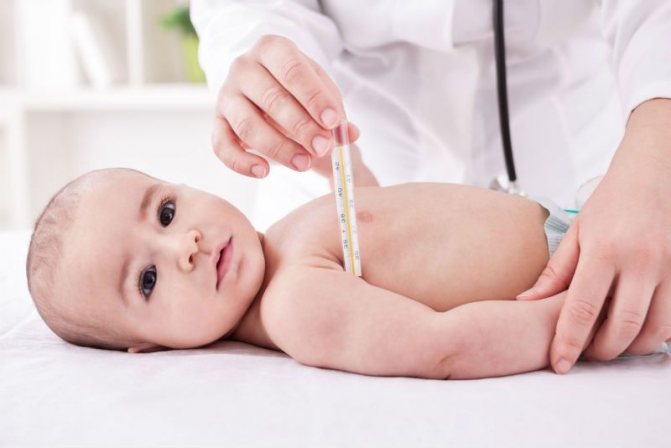
And simple antipyretic drugs for newborns help if the child’s condition is not severe. They facilitate the functioning of children's immunity and contribute to a speedy recovery from illness.


